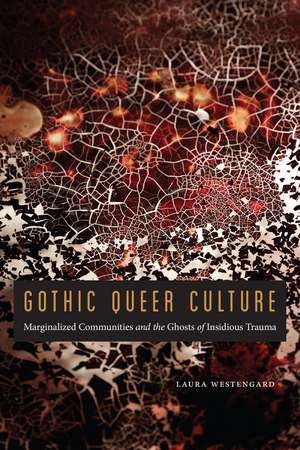Gothic Queer Culture: Marginalized Communities and the Ghosts of Insidious Trauma: Expanding Frontiers: Interdisciplinary Approaches to Studies of Women, Gender, and Sexuality
Autor Laura Westengarden Limba Engleză Paperback – 30 sep 2019
In Gothic Queer Culture, Laura Westengard proposes that contemporary U.S. queer culture is gothic at its core. Using interdisciplinary cultural studies to examine the gothicism in queer art, literature, and thought—including ghosts embedded in queer theory, shadowy crypts in lesbian pulp fiction, monstrosity and cannibalism in AIDS poetry, and sadomasochism in queer performance—Westengard argues that during the twentieth and twenty-first centuries a queer culture has emerged that challenges and responds to traumatic marginalization by creating a distinctly gothic aesthetic.
Gothic Queer Culture examines the material effects of marginalization, exclusion, and violence and explains why discourse around the complexities of genders and sexualities repeatedly returns to the gothic. Westengard places this queer knowledge production within a larger framework of gothic queer culture, which inherently includes theoretical texts, art, literature, performance, and popular culture.
By analyzing queer knowledge production alongside other forms of queer culture, Gothic Queer Culture enters into the most current conversations on the state of gender and sexuality, especially debates surrounding negativity, anti-relationalism, assimilation, and neoliberalism. It provides a framework for understanding these debates in the context of a distinctly gothic cultural mode that acknowledges violence and insidious trauma, depathologizes the association between trauma and queerness, and offers a rich counterhegemonic cultural aesthetic through the circulation of gothic tropes.
Gothic Queer Culture examines the material effects of marginalization, exclusion, and violence and explains why discourse around the complexities of genders and sexualities repeatedly returns to the gothic. Westengard places this queer knowledge production within a larger framework of gothic queer culture, which inherently includes theoretical texts, art, literature, performance, and popular culture.
By analyzing queer knowledge production alongside other forms of queer culture, Gothic Queer Culture enters into the most current conversations on the state of gender and sexuality, especially debates surrounding negativity, anti-relationalism, assimilation, and neoliberalism. It provides a framework for understanding these debates in the context of a distinctly gothic cultural mode that acknowledges violence and insidious trauma, depathologizes the association between trauma and queerness, and offers a rich counterhegemonic cultural aesthetic through the circulation of gothic tropes.
| Toate formatele și edițiile | Preț | Express |
|---|---|---|
| Paperback (1) | 200.53 lei 3-5 săpt. | +16.95 lei 10-14 zile |
| Nebraska – 30 sep 2019 | 200.53 lei 3-5 săpt. | +16.95 lei 10-14 zile |
| Hardback (1) | 395.70 lei 6-8 săpt. | |
| Nebraska – 30 sep 2019 | 395.70 lei 6-8 săpt. |
Preț: 200.53 lei
Nou
Puncte Express: 301
Preț estimativ în valută:
38.38€ • 39.82$ • 32.08£
38.38€ • 39.82$ • 32.08£
Carte disponibilă
Livrare economică 22 februarie-08 martie
Livrare express 11-15 februarie pentru 26.94 lei
Preluare comenzi: 021 569.72.76
Specificații
ISBN-13: 9781496217028
ISBN-10: 1496217020
Pagini: 288
Ilustrații: 10 photographs, index
Dimensiuni: 152 x 229 x 19 mm
Greutate: 0.39 kg
Editura: Nebraska
Colecția University of Nebraska Press
Seria Expanding Frontiers: Interdisciplinary Approaches to Studies of Women, Gender, and Sexuality
Locul publicării:United States
ISBN-10: 1496217020
Pagini: 288
Ilustrații: 10 photographs, index
Dimensiuni: 152 x 229 x 19 mm
Greutate: 0.39 kg
Editura: Nebraska
Colecția University of Nebraska Press
Seria Expanding Frontiers: Interdisciplinary Approaches to Studies of Women, Gender, and Sexuality
Locul publicării:United States
Notă biografică
Laura Westengard is an associate professor of English at the New York City College of Technology, City University of New York.
Cuprins
List of Illustrations
Preface
Acknowledgments
Introduction: Queer Cultures and Insidious Trauma
1. Haunted Epistemologies: Gothic Queer Theory
2. Live Burial: Lesbian Pulp and the “Containment Crypt”
3. Monstrosity: Melancholia, Cannibalism, and HIV/AIDS
4. Sadomasochism: Strategic Discomfort in Trans* and Queer of Color Performance Art
Conclusion: The Challenges of Neoliberalism
Notes
Bibliography
Index
Preface
Acknowledgments
Introduction: Queer Cultures and Insidious Trauma
1. Haunted Epistemologies: Gothic Queer Theory
2. Live Burial: Lesbian Pulp and the “Containment Crypt”
3. Monstrosity: Melancholia, Cannibalism, and HIV/AIDS
4. Sadomasochism: Strategic Discomfort in Trans* and Queer of Color Performance Art
Conclusion: The Challenges of Neoliberalism
Notes
Bibliography
Index
Recenzii
"The real reason why Gothic Queer Culture is impossible to put down is that in addition to being meticulously argued, it is celebratory. In the spirit of Lady Gaga’s gleefully bloody and irreverent meat dress, with which Westengard opens the book, Gothic Queer Culture gracefully sidesteps moralizing judgements of the artists and writers whose challenging work it examines, choosing instead to emphasize the affirmative power of reveling in the lurid grey areas that queer artists and their work so often occupy."—Elizabeth Simins, Art Discourse
“This tour-de-force of literary and cultural analysis connects eighteenth-century Gothic obsessions with traumatic realities of the twenty-first century. Queer theory, lesbian pulp fiction, the melancholy of AIDS, and sadomasochism—Laura Westengard helps us to understand these phenomena as never before.”—George E. Haggerty, distinguished professor emeritus at the University of California, Riverside
“Westengard takes a common idea—that gothic is queer—and inverts it to show the effects of unacknowledged trauma on marginalized communities. Gothic Queer Culture establishes Westengard as an exciting new voice in critical trauma studies, gothic studies, and queer theory.”—Nowell Marshall, author of Romanticism, Gender, and Violence: Blake to George Sodini
Descriere
Using interdisciplinary cultural studies to examine gothicism in queer art, literature, and thought, Laura Westengard argues that during the twentieth and twenty-first centuries a queer culture has emerged that challenges and responds to traumatic marginalization by creating a distinctly gothic aesthetic.

















